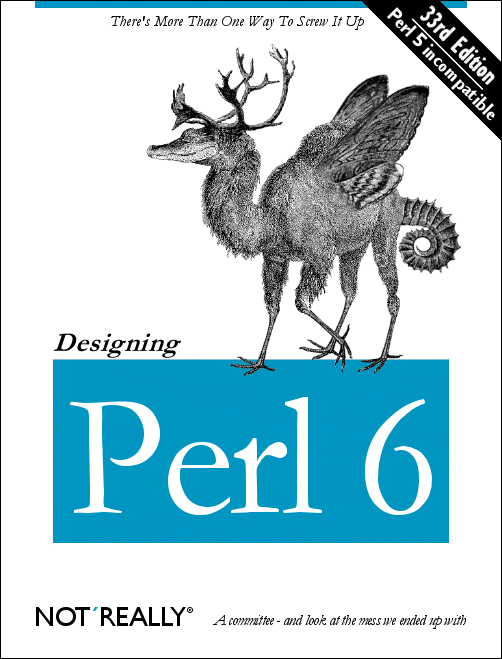Perl 6 nightmare
Perl afficionados will no doubt be frightened by the cover of the new Perl 6 book:

(found on http://bleaklow.com/blog/archive/000018.html)
Labels: perl
Trucs à garder, que je ne sais où mettre... Stuff I want to keep, but don't know where to put
Perl afficionados will no doubt be frightened by the cover of the new Perl 6 book:

(found on http://bleaklow.com/blog/archive/000018.html)
Labels: perl
pg_user and pg_group. For some reason, I had a hard time today to find how to combine them.SELECT groname,usename from pg_group,pg_user where usesysid = any(grolist);pg_group lists the user id's in each group. Besides being id's and not names, the problem is that they are in an array field. To get a list of groups with the users they contain, or a list of users with the groups they are a member of, this is what I needed with my postgres 7.2:*= which may not be installed by default. It can be found in the contrib directory of the source.SELECT groname from pg_group WHERE grolist *= 100;CREATE OR REPLACE FUNCTION comma_cat(text, text) RETURNS text AS
'SELECT CASE
WHEN $2 is null OR $2 = '''' THEN $1
WHEN $1 is null OR $1 = '''' THEN $2
ELSE $1 || '', '' || $2
END'
LANGUAGE 'sql';
DROP AGGREGATE list text;
CREATE AGGREGATE list(
sfunc1=comma_cat,
basetype=text,
stype1=text,
initcond1=''
);
SELECT g.groname, list(u.usename) FROM pg_user u, pg_group g
WHERE g.grolist *= u.usesysid GROUP BY g.groname;
SELECT u.usename, list(g.groname) FROM pg_user u, pg_group g
WHERE g.grolist *= u.usesysid GROUP BY u.usename;